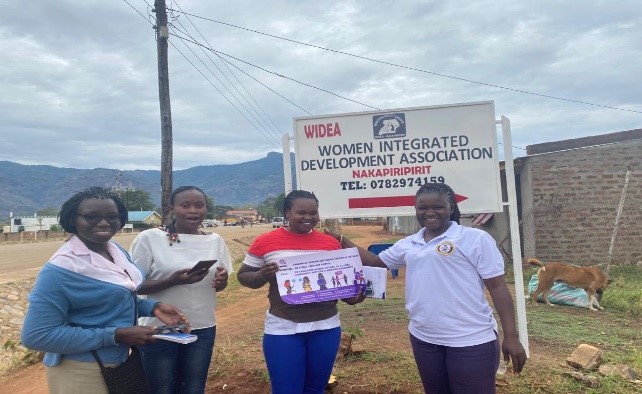
Category: Latest_news


JOB VACANCY: PROGRAM CORDINATOR
| Job Title: Program Coordinator
Reports to: Executive Director
|
|
| The Program Coordinator, leads the operational functions of program management, for helping to further grow the network to a new phase, oversees the coordination of all aspects of ongoing and new programs including; planning, organizing, staffing, leading, and controlling program activities. WHRDN-U has a great mission and we are looking for someone That is passionate passion, creative or flexible and adaptable.
Primary Responsibilities The Program Coordinator, shall be responsible, but not limited to the following duties: 1.Fundraising · Actively secure adequate resources and ensure a diverse funding base for WHRDN-U · Writing program funding proposals to guarantee uninterrupted delivery of services to the organizations and WHRDs at risk or under threat · Track proven record and experience in writing winning proposals and have experience in securing funds. · Maintaining productive working relationships with donors and partners 2.Implementing & Managing programs: · Take lead in the overall formulation of projects and programs and development of the program and fundraising strategies using the WHRDN-U’s Feminist Holistic Protection frame work for WHRDs. · Implementing and managing changes and interventions to ensure project goals are achieved. · Supervising overall implementation, monitoring and evaluation of all programs undertaken by WHRDN-U · Supervising and implementing general administration following organizational policies; · Monitoring and analyzing legal and political developments, human rights and rule of law and security and safety situation of Women Human Rights Defender in different regions in Uganda. · Responsible for the implementation of communication and Advocacy activities of WHRDNU- · Participate in the implementation of capacity building and Protection & Rapid Response activities · Ensures compliance with and implementation of all donor –related and project specific-policies · Briefing and position papers for management, Board members, partners and donors · Responsible for developing program management schedules, activity plans, and monitoring and evaluation criteria against program goals as well as recommending reviews and proposals to ensure that program activities address actual needs. · Actively participate and represent the organization in various meetings, seminars, workshops etc to share WHRDN-U’s perspectives on various issues · Oversee the performance and supervise program staff, volunteers and consultant’s/resource persons · Have strategic oversight on content and finances to ensure that program goals are met
|
3.Leadership.
· Serve as a member of the Management Committee of WHRDN-U · In consultation with the Accountant oversee the development of an institutional budget and operating plan for the different programmatic areas of capacity building, protection and emergency support, advocacy and networking. · Supervising with the entire program team, including planning and organizing events, trainings and workshops · Developing new programs and resource mobilization to support the strategic direction of the organization Creating and managing long-term goals. · Support the recruitment, inductions, appraisals, salary planning, staff benefits, staff development and training: Qualifications and Experience Outstanding candidates have · Must be a Woman Rights Activists, and strongly believes in Feminists and passionate about women’s rights and gender equality. · Master’s degree in human rights, law, social sciences, political science or related field from accredited academic institution with a minimum of five years of relevant professional experience in program/project management, Good conceptual and analytical capacity, very good budgeting, project management and report writing skills. · Strategic fundraising experience that includes developing and maintaining donor relationships · Capacity to coordinate projects, organize and lead the implementation of plans and processes · Staff management and Team work · Very good budgeting, project management and report writing skills
Highly desirable attributes, skills and competencies · Excellent oral and written communication skills · Strong time management and coordination skills. · Planning and organizing Ideally, the person hire is · Is able to work under pressure & independently to meet deadlines · Innovative and flexible · Able to manage change and complicated operational environment and network dynamics · Commitment to and experience with feminism, women’s rights, human rights, intersectional analysis, · Proven track record and experience in management and programming, coalition or network related to gender/women’ rights, GBV programming · Ability and willingness to travel across the country · . · . Compensation: Salary to be determined, based on experience |
| How to apply:
Location The positions will be held in Kampala Uganda with frequent travels with in the country. Applicants should send a one-pager letter of Motivation-explaining how you meet the qualifications and outlining why you want to work for WHRDN-U)., CV, and contacts of three referees ( Two of these must have supervised you directly either currently or recently in executing above duties ) , to info@whrdnuganda.org (No phone calls please) to Women Human Rights Defenders Network Uganda (WHRDN-U) not later than 4th May April 2023 at 5:00pm, addressed to the Executive Director. ONLY short listed candidates shall be contacted. Do not send scanned copies of certificates. Please specify the position in the subject line of your email. For more information , please visit www.whrdnuganda.org
|
|
| NOTE: ONLY FEMALE CANDIDATES ARE PREFFERED FOR ALL POSITIONS | |

JOB VACANCY: FINANCE AND ADMINISTRATION MANAGER
The Women Human Rights Defenders Network Uganda (WHRDN-U) is a nationwide membership organization of diverse women human rights defenders (WHRDs), organizational and individuals. We currently represent over 148 WHRDs from diverse social movements in Uganda promoting the rights of women defenders to a safe and secure work environment with a vision of having a society where fundamental human rights are upheld and respected. We exist to promote a feminist holistic approach integrating a gender perspective as a frame work for protection of WHRDs, We aim to provide WHRDs with access to gender-sensitive and timey protection and empowerment resources, tools to combat gender-based and other forms of violence connected to their work. . WHRDN-U is hereby seeking to recruit competent and vibrant Ugandans to fill in the following positions.
| Job Title: Finance and Administration Manager
Reports to: Executive Director |
|
| Overview of Position. WHRDN-U is seeking an experienced, Finance and Administration Manager who will be responsible for managing the full spectrum of WHRDN-U’s including; monthly accounting cycle, budgets and monitoring, funder finances and grant reporting, year-end, audit and other related functions. This is a senior-level, hands-on position requiring an organized and experienced individual who has excellent judgement, problem-solving and analytic skills, can work independently and has experience working in a complex non-profit funding environment. In addition to carrying out day-to-day financial work, the Senior Finance Officer will bring expertise on financial systems, policy, and controls. They will be flexible, adaptable and willing to take on a range of tasks when needed.
Primary Responsibilities 1.Financial management
2.Resource mobilization
|
Financial systems and controls
Audit
Qualifications Values, competencies, skills and experience · A minimum of 3-5 years of experience in a senior-level finance and leadership role; solid understanding of and hands-on experience with full-cycle accounting; · Extensive experience with non-profit, fund-based budgeting and monitoring, and preparation of funder reports; · Proven experience as a problem-solver, with good analytical skills, judgment and ability to think strategically; discretion and ability to handle confidential matters; · Experience using the following software: i) QuickBooks online; ii) Excel (intermediate skill level); iii) Proficiency with and understanding of databases; iv) online apps or programs for payments, payroll, expenses, Google suite; · Demonstrated ability to work independently with minimal supervision to meet multiple deadlines, at times under pressure; · Post-graduate education, preferably in accounting; related courses in financial management, bookkeeping is an asset; · A commitment to women’s human rights and social justice; · Experience working with multiple currencies and foreign exchange is an asset; · Knowledge of Ugandan n Accounting Standards for Not-for-Profit organizations is an asset. Compensation: Salary to be determined, based on experience, |

JOB VACANCY: VOLUNTEER
Organization:
WomenHumanRightsDefenders
Network Uganda (WHRDN-U)
Duty Station: Kampala, Uganda
About US:
WomenHumanRightsDefenders Network Uganda (WHRDN-U), is a registered not for profit national network with a membership of more than 97 women organizations and individuals. The WHRDN-U, was founded in 2017 by women defenders to promote a feminist holistic approach integrating a gender perspective, focusing on building
supportive networks and coordination among WHRDs from diverse social movements
and causes in Uganda. Thereby building the capacity for protection of WHRDs,
offering protection and emergency response for WHRDs at risk, and Advocacy for
protection of WHRDs.
Job Summary: The Volunteer will support WHRDN-U and should
be willing to join a growing organization. The incumbent will gain experience
in project management at a national feminist organization and take part in
promoting the rights and protection of WHRDs as well as raising the visibility
of the violence and risks WHRDs face.
Main responsibilities and Tasks
- Support with document and story writing of the lived experiences of WHRDs.
- In consultation with the Communications resource person and the Executive Director support with Support with regular dissemination of information to network members.
- organizational digital content creation; pursue visibility for the organization.
- In consultation with the Communications resource person and the Executive Director Support with regular dissemination of information to network members.
- In consultation with the Communications resource person and the Executive Director write articles for publication on website.
- In consultation with the Communication’s resource person support in social media content, internet related campaigns and advocacy
- In collaboration with relevant staff, assist to organize, prepared and facilitate relevant trainings, meetings and engagements for WHRDs
- Assist to organise annual events
- Support in the production of activity reports during events, meetings, trainings.
- Build and maintain productive relationships with members of the Network, partners and partners in Civil society
- Any other duties assigned by the Programs Coordinator in consultation with the Executive Director.
Qualifications/ Education/Experience
- The ideal candidate must hold a Bachelors’ Degree from accredited institution in any of the areas; Mass communication, social sciences, development studies, Political Sciences or any other related fields
- At least one year of demonstrated experience working with human rights NGOs in communication and program activities
- Result oriented, interesting in learning and recommending new approaches or tech solutions.
- With evidence excellent writing and public speaking skills
- Must have proven interest in reading and researching
- Experience in graphic design
- Ability to organize events and train civil society organizations
- Extensive knowledge of social media and related communication platforms
Desired Skills and Competencies
- Strong organization, communication, Interpersonal and time-management skills
- Proven ability to work under pressure to meet deadlines and ability to multi-task (very desired)
- Result oriented with good interpersonal skills
- Responsible, flexible, adaptable, and will to travel up country for field work
- Demonstrate commitment feminism principles and end Violence Against Women and, human rights,
- Proven team player
- Proven ability to organize and work collaboratively with a wide range of stakeholders;
- People-oriented, sociable, approachable, socializing skills, out-going and dynamic
NB: This is a paid volunteer position.
How to Apply:
All suitably qualified and interest candidates should send their application letters with
detailed CVs indicating 3 referees, two of whom should have been direct
supervisors and addressed to the Executive Director and submitted to
info@whrdnuganda.org.
Deadline: 30th April 2023.
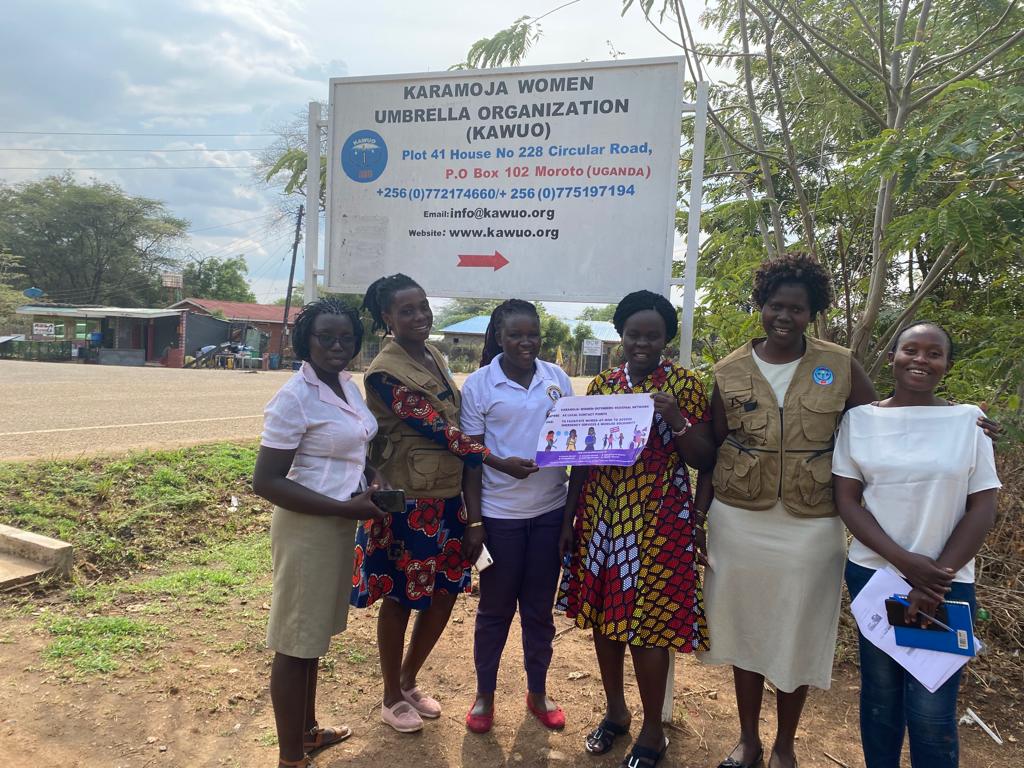
Protected: WHRDN-U CONDUCTS SOLIDARITY VISIT TO COMMUNITY BASED WHRDS IN RWENZORI REGION
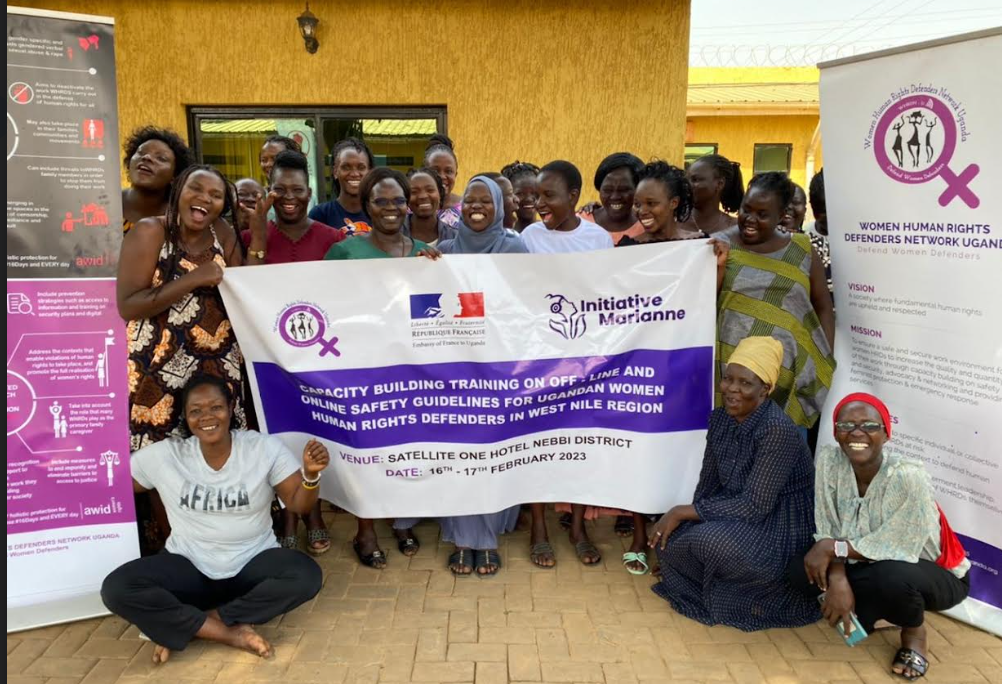
West Nile Women Human Rights Defenders receive training in online and offline security guidelines
The training workshop for WHRDs from West Nile region on off-line and online safety guidelines was conducted on the 16th and 17th February 2023 at the Satellite hotel Nebbi district in West Nile. The workshop was supported by the French Embassy- in Uganda in partnership with Women Human Rights Defenders Network Uganda (WHRDN-U). The 2 day workshop consisted of 22 participants from across the West Nile region, involved in the defense of human rights and were trained by a team from the WHRDN-U secretariat.

To this end, the training focused on physical security, personal security, information security, office & home security and digital security. Participants discussed some practical measures some of which they already take to minimize security risks and learned about others that they might not have been aware of yet. Participants committed to use the following measures and deal with specific threats in the future for their security and safety:
- Create and maintain secure passwords to protect sensitive files on your computer, protect computers from malware and hackers, backing information
- Introduce a security registration book for visitors at office
- The different physical and digital strategies for personal and organizational protection of WHRDs.

The workshop used interactive activities to help people understand the information, and take part in discussions. For instance; in role plays participants acted out a situation, in small group discussions. Similarly, participants composed a song to help them focus their attention and to make it easy for them to remember the things they learned.

This training workshop was implemented on the basis of the off-line and on-line safety guidelines of WHRDs launched by the UNWOMEN, UNOHCR and WHRDN-U in 2021. The aim of the workshop was to strengthen the capacity of WHRDs and mitigate the impact of online and offline attacks against WHRDs, provide knowledge on mitigating gender-based attacks, criminalization of their work, as well as physical and personal security management, offer practical strategies for enhancing WHRD’s safety online & offline as well as provide WHRDS with basic safety tools for WHRDs in preventing and responding to attacks against them.

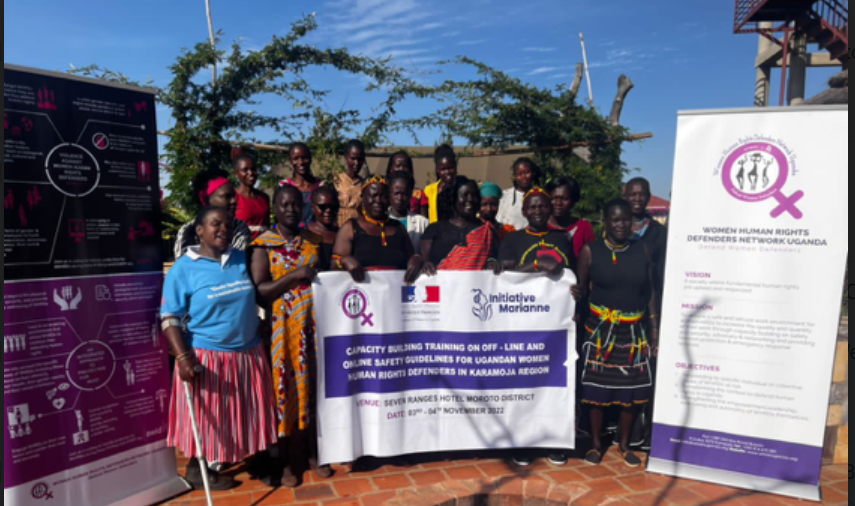
Women Human Rights Defenders undergo capacity building training in online and offline security guidelines
In November 2021, UN-WOMEN, UNOHCR (United Human Rights Office of The High Commissioner) and the WHRDN-U (Women Human Rights Defenders Network Uganda), published and launched safety guidelines for WHRDs titled “Our Voices, Our Power: Online and Offline Safety and Security guidelines for Women Human Rights Defenders in Uganda”. The report also called for urgent measures to deal with challenges facing WHRDs including equipping WHRDs with capacities and skills to mitigate the impact of online and offline attacks.
Upon this background, WHRDNU with support from the French Embassy of Uganda, conducted workshop to 20 WHRDs from Karamoja region. The training was conducted on 3rd and 4th November,2022, at Seven ranges hotel, in Moroto district. The two day activity was organized to strengthen the capacity of WHRDs and mitigate the impact of online and offline attacks against WHRDs, provide knowledge on preventing and mitigating gender-based attacks, criminalization of their work, as well as physical and personal security management, offer practical strategies for enhancing WHRD’s safety online & offline as well as provide WHRDS with basic safety tools for WHRDs in preventing and responding to attacks against them.

Remarks from WHRDN-U Secretariat
Ms. Brenda Kugonza of the WHRDN-U started by appreciating the French Embassy in Uganda noting that without their financial support, the training would not have happened. She thanked WHRDs for the good work they do to defend rights in Karamoja region and welcomed them to the training. Brenda then gave details on the objectives of training. She said that training workshop is to increase the knowledge and skills of the participants and their organizations the in relation to off-line and on-line safety guidelines. It would facilitate the spread of information, skills, and culture to prevent and respond to attacks, threats and risks both on-line and off-line by WHRDs. Training workshop was an opportunity to strengthen the capacity of Karamoja WHRDs because they had participated in developing the guidelines during a workshop that was conducted by UNWOMEN, UNOHCHR and WHRDN-U .

Remarks from the district representative
Ms. Betty Nakiru, a female police officer working with Moroto District Child and Family Protection Unit, in her remarks appreciated the WHRDN-U for supporting the work of WHRDS in Karamoja region. She urged participants to report to police when attacked for supporting girls and women the community. If also us the police women are attacked for supporting survivors of domestic violence and what about you. she noted that if women defenders are attacked, then the marginalized people suffer. She ended her remarks by urging them to get her contacts.

Role plays. Types of violence against WHRDs
Joan Namulondo of WHRDN-U, employed the role play methodology f in this session to further help participants understand the concepts. Four (4) scenarios (See below) were role played by participants to identify the online and offline, attacks, and gender-based attacks faced by WHRDs in their region. Reflections and learnings scenarios included:
- Human rights work is risky and the need to prepare to deal with un expected risks, threats, and security incidents.
- Human Rights activities cannot be successful without security measures.
- WHRDs in Karamoja, have suffered the same risks such as those roles played

DAY 2
Digital and social media security management
The purpose of the session was to learn about Digital and Online Security Management. The learnings were imparted when participants mentioned that digital security in relation to smart phones, mobile phones, internet café, phones, cameras, modems, flash discs, emails, watsapp, Facebook, Twitter, Instagram, Tiktok etc. Through a brain storming session, participants learnt some basic computer security measures such as to install antivirus to protect their computers from malware and hackers, to create and maintain secure passwords, have strong different passwords for different services and phone security measures such as the safest mobile phone is a cheap, unregistered, don’t save sensitive information on your phone, make sure all your information is deleted on your mobile before selling it or having it repaired, destroy unusable phones and old sim cards before discarding them.

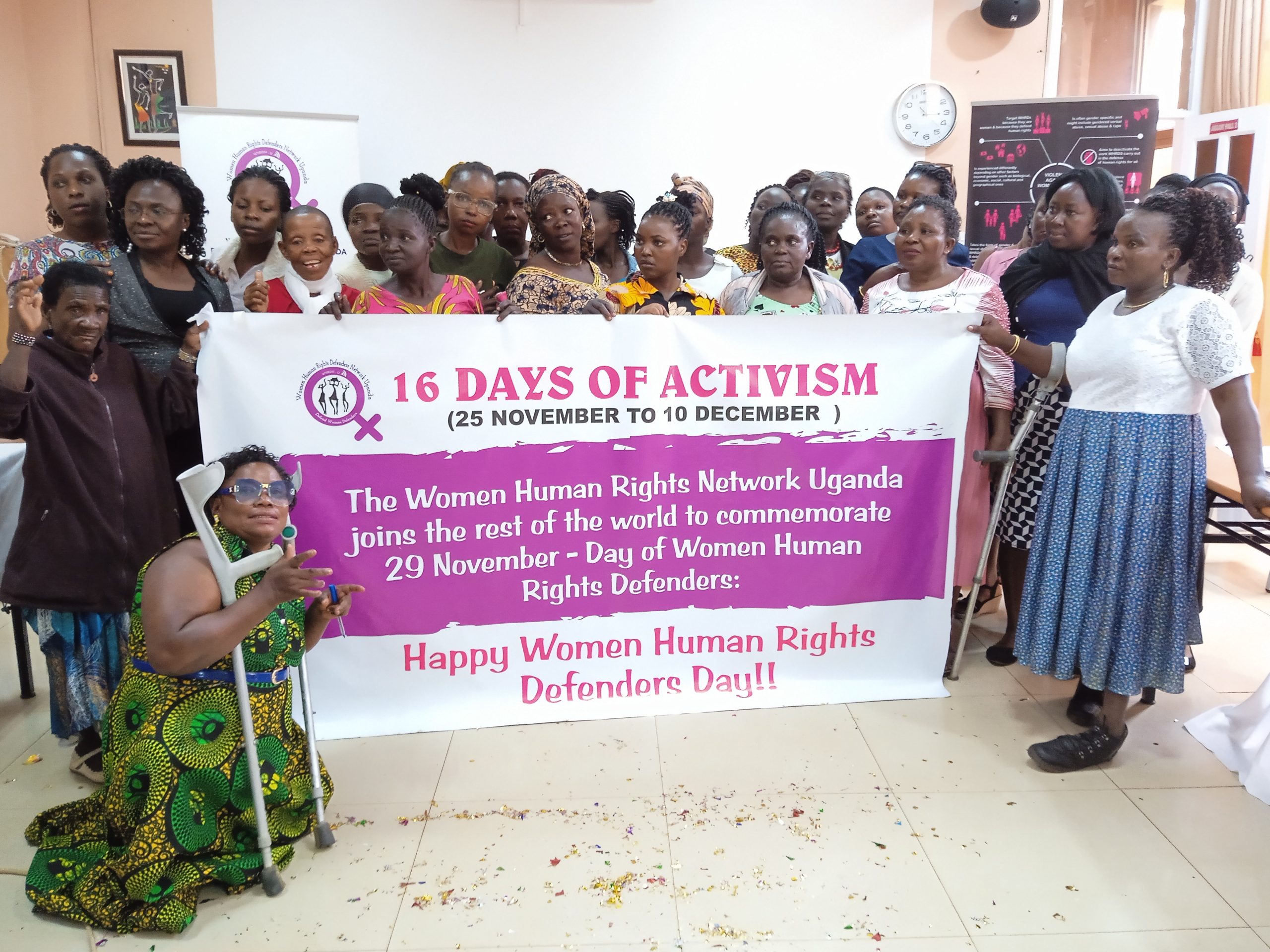
WHRDNU commemorates International Day for Women Human Rights Defenders 2022
29th November of every year is a momentous commemoration of the diligent work of Women Human Rights Defenders. This year’s commemoration was no exception to the previous years with Women Human Rights Defenders Network Uganda (WHRDNU) appreciating the diligent and selfless contribution of WHRDs to ensure rights of all are respected.

WHRDNU Executive Director, Brenda Kugonza shares message in commemoration of International Women Human Rights Defenders Day 2022.
In an interview with Civil Rights Defenders, Brenda Kugonza shares the discrimination, harassment, and gender-based violence WHRDs in Uganda still face.
TODAY WE ACKNOWLEDGE THE BRAVE WOMEN FIGHTING FOR (Y)OUR HUMAN RIGHTS ✊ ♀️
They face discrimination, harassment, and gender-based violence. Still – or maybe because of that – they continue to fight.#InternationalWHRDsDay @WHRDNU pic.twitter.com/QXaHejAubo
— Civil Rights Defenders (@crdefenders) November 29, 2022

In a sit down with International Service For Human Rights, Brenda Kugonza speaks on how International advocacy is a tool to advance our human rights work, but it is also a tool that will support us in consolidating our protection as women human rights defenders.
Watch full video below.
Happy International Women Human Rights Defenders Day 2022!
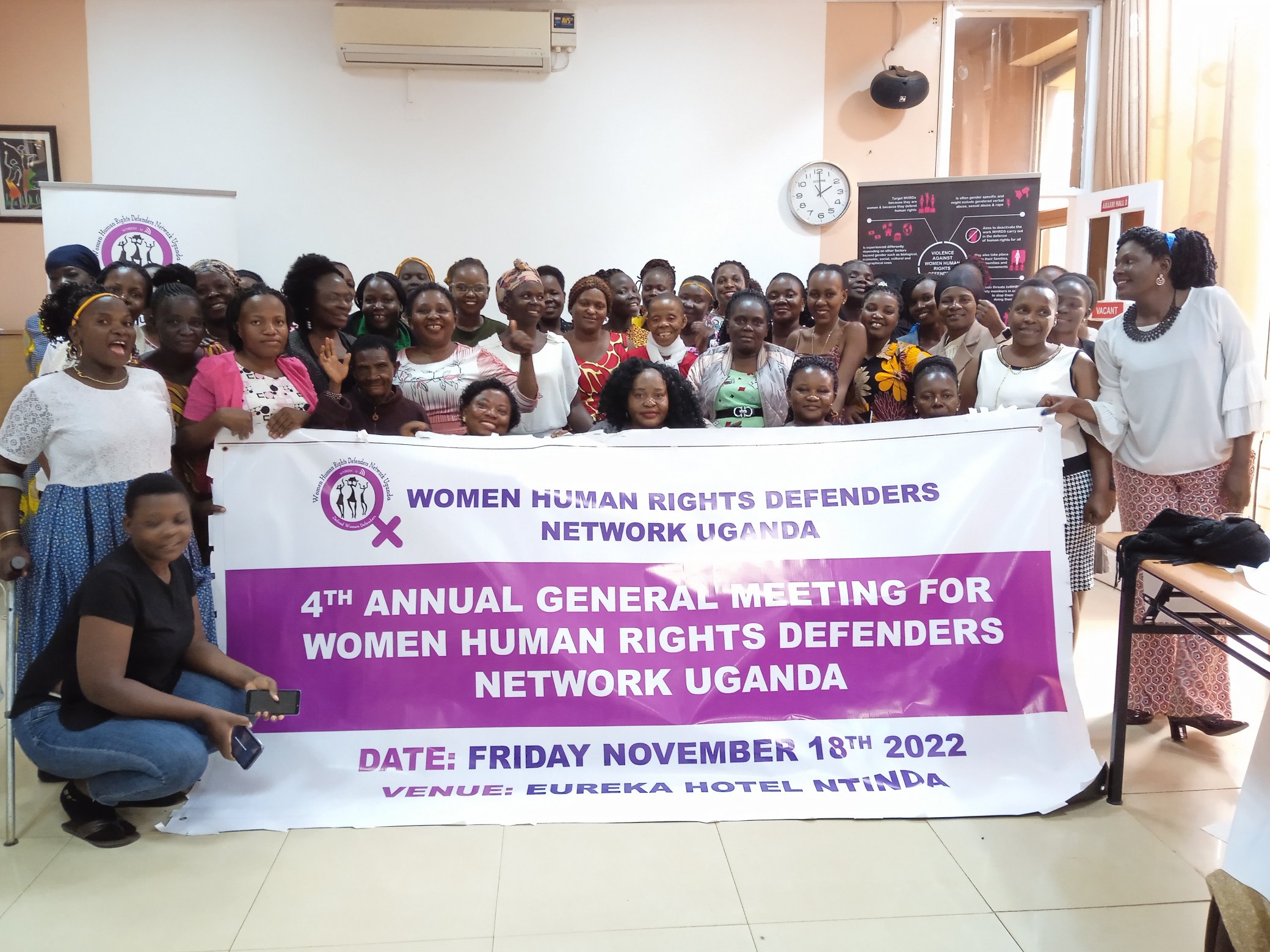
The Annual General Meeting 2022
On 18th November 2022, WHRDN-U held their 3nd Annual General Meeting at Eureka Hotel, Kampala. The meeting was graced with presence of forty three network members and attracted a discussion on what the network has achieved in the year 2022. During the meeting, the Board members presented the following reports to the network members.
- The Annual Progress Report 2021
- The Audited Reports
- The Previous Minutes
It was also an opportunity for interaction and networking among the staff WHRDN-U, the board members and the WHRDS.
Photos of the Annual General Meeting 2022





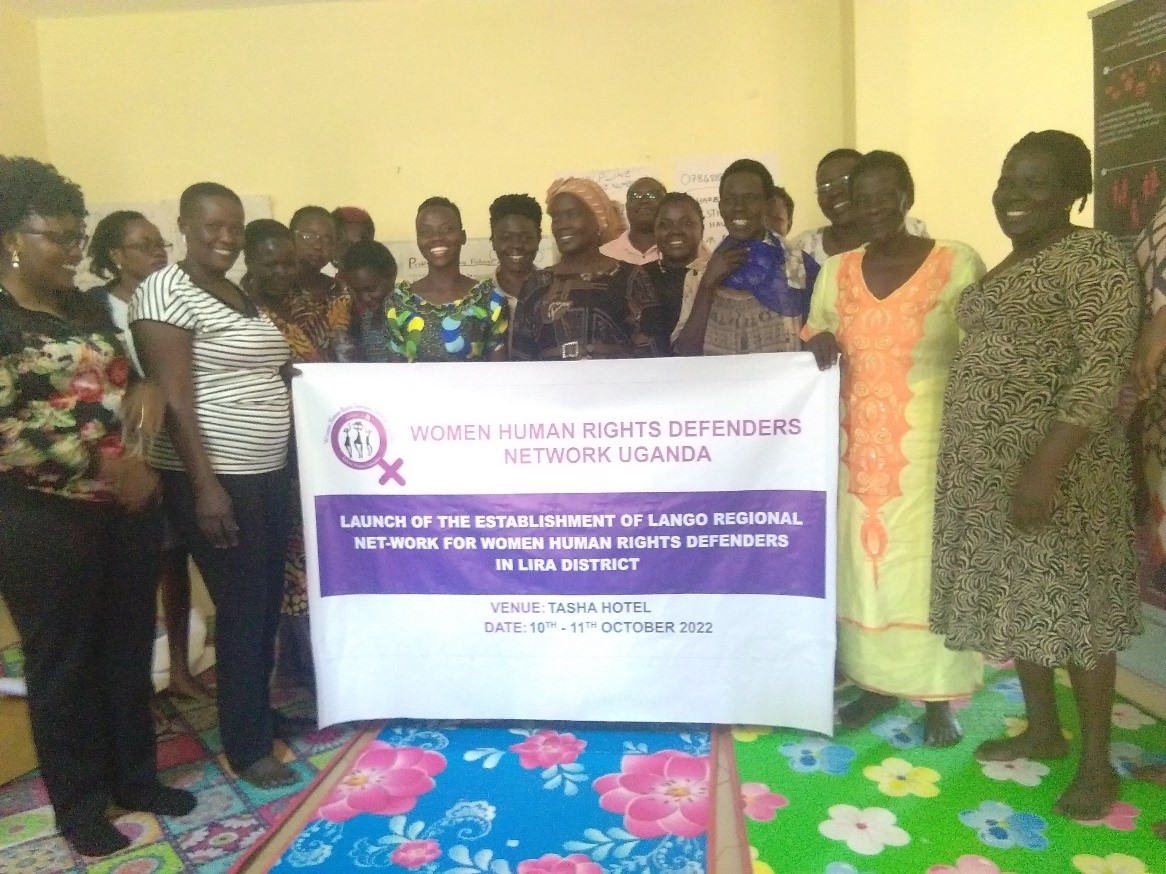
WHRDNU launches Lango Regional Network
Women Human Rights Defenders Network Uganda (WHRDNU) conducted a two days training to launch the Lango Regional Network for Women Human Rights Defenders from October 10th-11th2022 at Hotel Tasha in Lira district.
Session one: understanding each other as an activist River of Life
Participants discussed their journeys as human rights defenders explaining how they have not been straight with ups and downs, some calm moments but also moments to cherish/opportunities

- Akiria Patricia shared that networking through relationships like friends enabled her raise funds to fulfill her passion to fight for the rights of sex workers and child abuse, but the community has constantly discriminated against her due to ignorance.
- Abalo Grace said, she identified a child who as denied the right to food, then she reported a case to police, that she has also faced some challenges like some security officers not supporting cases she reports.
- Barbra Apio shared on it is not easy to carry out activism work in Apac especially defending LBQT rights, she has often been referred to as one promoting immorality and has been arrested but managed to continue because of the passion for the work.

Understanding the nature of threats/challenges facing WHRDs
Different experiences on the threats/challenges were presented based on the different Thematic Action Groups


Day 2
Role plays
Four role-plays were acted to emphasize on who a defender is and the nature of threats received by the WHRDs in order to request for protection support
